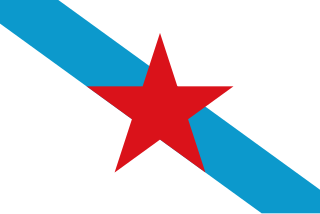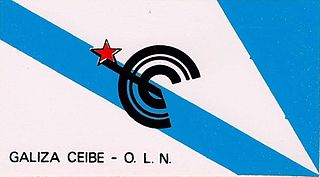Gallery
- Demonstration in the 1991 Día Nacional de Galicia.
- Graffiti supporting the organization.
- Document of the I National Assembly.
Assembly of the United People Assembleia do Povo Unido | |
|---|---|
| Founded | 1989 |
| Dissolved | 1995 |
| Newspaper | Povo Unido |
| Youth wing | AMI |
| Women's wing | Galician Nationalist Women (MNG) |
| Ideology | Galician independence Socialism Feminism |
| Political position | Radical left |
| Trade union affiliation | Intersindical Nacional dos Traballadores Galegos (INTG) and Confederación Intersindical Galega (CIG) |
| Colors | Red, white, blue |
The Assembly of the United People (APU) (Galician language: [1] Assembleia do Povo Unido) was a Galician political organization, with an independentist, socialist and feminist ideology. It was formed in 1989 from a split of the first Galician People's Front, and disappeared with its self-dissolution in 1995.
The Assembly of the United People was born in June 1989 from a severe crisis in FPG, fractured into two fractions confronted within the Galician independence movement that coexist in the said FPG, the PCLN, the EGPGC (Guerrilla Army of the Free Galician People, armed organization) the Comités Anti-repressivos (Anti-repressive Committees), the JUGA (Juntas Galegas pola Amnistia) and MNG (Galician Nationalist Women). On the 28 and 29 October 1989, the National Constituent Assembly of the APU was held in Santiago de Compostela. The assembly blamed the Communist Party of National Liberation for the split of the FPG and said that the majority of the front's membership supported them.
The APU follows the classic model of the national liberation movements in the Third World. That was reflected in the foundational political documents, that said "The revolutionary advancement as the sum of the political and military struggle", and that claims the validity of revolutionary violence to take the power, using examples like Cuba, Algeria, Vietnam or Nicaragua.
The organization aspired to the creation of a "Popular Unity" or "National Liberation Front" agglutinating the Galician worker people and the popular classes: the industrial proletariat, sailors, peasants and petty bourgeoisie", standing as the indispensable principles to integrate this front, the understanding of the armed struggle in Galicia and the fundamental role of the National Liberation process, the Total Amnesty, understood as the freedom of the galician political prisoners and the development of a political, social and economic program in accord to the interests of the popular classes. [2] This unity for national liberation as proposed by the APU had as potential partners the other nationalist and left-wing organizations existing in Galicia at the time: BNG, PSG-EG and the FPG, but this never took place.
At the linguistic level, the APU advocated and practiced reintegracionism (defence of the Galician-Portuguese-Brazilian language unity) and used the Galician Association of Language standard.
The JUGA were their reference anti-repressive organization of reference and Galician Nationalist Women (MNG) were the feminist organization of reference. The party had some influence in the trade union field, through the INTG, integrated later in the Confederación Intersindical Galega.
In 1990 APU conducted a campaign for the self-determination of Galicia. The following year, present municipal candidates in Santiago de Compostela, Vigo and Ferrol, with the slogan O independentismo aos concelhos. [3] The election results were considered disappointing. [4] There was also an extraordinary assembly in which the fall of the regimes of Eastern Europe was debated. In 1992, eleven militants of the APU were expelled from the INTG accused of supporting the armed struggle of the EGPGC. The following year, the party organized the III National Assembly and soon after launched the double campaign This is not Spain and Because Galiza is not Spain, [5] and promoted abstention to the general elections of that year. In October of the same year, the APU presented a list for the elections to the autonomous Galician Parliament and won 1,492 votes (0.10%). In 1994 and 1995 takes place, in two parts, the IV National Assembly. In the second assembly (February 1995) the dissolution of the organization is approved due to the poor electoral results, the lack of influence in the galician society and the end of the EGPGC's armed struggle.
In 1990 the organization conducted a campaign in favor of self-determination of Galicia. Between 1989 and 1994, the APU called for demonstrations in the Day of the Galician Fatherland (July 25) in various ways. At 89, together with FPG, with the motto "Independence"; at 90, announces in conjunction with FPG, LCR, PCE (ML) and PCPG with the motto Autodeterminación, camiño da independencia; [6] at 91, alone, with the motto Em luita pola independência; [7] at 92, also alone, with the motto Adiante pola independência; [8] in 1993 again alone with the motto Porque a Galiza non é España... independência [9] and in 1994 called for their last July 25 demonstration with the motto A Galiza sen medo berra independência!. [10]
The APU edited 11 numbers of its national magazine, Povo Unido, publishing the first number in February 1990 and the last in July, 1994 In September 1993, also published a Draft for the Constitution of Galiza. [11]
| Election | Votes | % | Seats |
|---|---|---|---|
| Ferrol city council election, 1991 | 101 | 0.29 | 0 / 25 |
| Santiago de Compostela city council election, 1991 | 60 | 0.15 | 0 / 25 |
| Vigo city council election, 1991 | 137 | 0.11 | 0 / 25 |
| Election | Votes | % | Seats |
|---|---|---|---|
| 1993 Galician regional election | 1,492 | 0.10 | 0 / 75 |

The Galician Nationalist Bloc is a political party from Galicia, formed with the merger of a series of left-wing Galician nationalist parties. It is self-defined as a "patriotic front".

Communist Party of National Liberation was a separatist political party in Galicia, Spain. PCLN was founded on 25 July 1986 by the 22 March Communist Collective. The collective had been launched earlier by 13 Central Committee members of the Galician People's Union (UPG) left UPG in protest of the decision of the Galician Nationalist Bloc to participate in the Galician parliament. Front figures of the collective was Mariano Abalo, general secretary of UPG, and Xan Carballo, general secretary of INTG.
The Galician People's Union is a Galician nationalist and communist political party, and is one of the registered political parties of Spain. The party publishes the magazine Terra e Tempo, and the secretary general is Néstor Rego.
The Galician People's Front is a Galician political organization with a socialist and independentist ideology.

Galician nationalism is a form of nationalism found mostly in Galicia, which asserts that Galicians are a nation and that promotes the cultural unity of Galicians. The political movement referred to as modern Galician nationalism was born at the beginning of the twentieth century from the idea of Galicianism.

Xosé Manuel Hixinio Beiras Torrado is a Galician politician, economist, writer and intellectual. He is professor of Structural Economy at the Faculty of Economic Sciences of the University of Santiago de Compostela. He is a former member of the National Council of the Galician Nationalist Bloc, he is currently the leader of Renewal–Nationalist Brotherhood, an independentist political party. He formerly had representation in the Galician parliament.
Loita Armada Revolucionaria(LAR) (English: Revolutionary Armed Struggle) was an armed Galician nationalist and left-wing independentist organisation. Linked to the political party Galician Party of the Proletariat and the organization Galiza Ceibe-OLN, the group was formed in 1978 and carried out several attacks around Galicia, such as bank assaults and bombing campaigns.

Confederación Xeral de Traballadores Galegos-Intersindical Nacional was a nationalist trade union centre in Galicia. CXTG-IN was founded in 1985, as a split from the Intersindical Nacional dos Traballadores Galegos (INTG). Fernando Acuña served as the general secretary of the organization. Politically the movement was close to Galician leftwing groups.

Renewal–Nationalist Brotherhood is a political party in Galicia. Formed in 2012, under the guidance of historical leader Xosé Manuel Beiras, Anova was formed by Encontro Irmandiño, the FPG, Movemento pola Base, the Galician Workers Front, and independents. Anova defines itself as a Galician nationalist, socialist, feminist, ecologist, internationalist organization and advocates for Galician independence. Its internal organization is run by assemblies.

Galiza Ceibe-OLN was an independentist and socialist political party in Galicia, Spain. Galiza Ceibe was founded on 1980 by the Galician Party of the Proletariat as a political and electoral front, originally to present a list in Vigo and in other galician municipalities under the name Agrupación Electoral Galicia Ceibe in the 1979 local elections.

The National Inter-Union of the Galician Workers was a Galician union with an anticapitalist, leftist and Galician nationalist ideology, direct heir of the Intersindical Nacional Galega (ING), and precursor of Confederación Intersindical Galega (CIG).
The Galician Party of the Proletariat (PGP) was a party galician independentist and Marxist-Leninist party formed in March 1978, as a continuation of Galician People's Union-Proletarian Line, a split of the original Galician People's Union. The Central Committee was clandestine, and even the party militants didn't know the members of it. The party supported armed struggle, which considered as anti-imperialist and anti-oligarchic. Its official magazine was called Sempre en Galiza.

The Galician Movement for Socialism was a Galician communist, pro-independence and feminist organization. The MGS was born in March 2009, although its origins go back to the summer of 2006. The MGS works inside the Galician Nationalist Bloc and the Confederación Intersindical Galega.

Commitment to Galicia is a Galician political party with a Galician nationalist, progressive ideology.

Galician Nationalist Youth, is the youth-wing of Compromiso por Galicia in Galicia (Spain). It was founded on November 2010 in the city of Santiago de Compostela as the youth-wing of Máis Galiza, and integrated within Galiza Nova and the Galician Nationalist Bloc until 10 March 2012, when the MNG broke with both organizations.

Galician Socialist Youth, was a youth political organization founded on April 25, 2009 in the city of Santiago de Compostela, that acted as the youth of the Galician Socialist Space. The organization self-dissolved and transformed itself in the Galician Nationalist Youth (MNG) in November 2010.

Encontro Irmandiño is a political organization that is part of Anova-Nationalist Brotherhood in Galicia, Spain. It used to be an internal current in the Galician Nationalist Bloc (BNG). EI was founded in 2007 and has an ideology based in Galician nationalism, direct democracy, anticapitalism, feminism and alter-globalization.
Independentist Students was a Galician independentist and socialist student union, formed by university students. FER was founded in December 1995. In 1996 EI gained several representatives in the University of Santiago de Compostela Council and in the Faculty Councils. In 1996, the student union grew significantly, although in 1997 and early 1998, the organization stopped growing. Despite their early success in the student elections, EI always focused in the struggle in the street; demonstrations and strikes were the main means of struggle. Between 1998 and 2000, the organization grew again, gaining presence in all the universities of Galiza and getting seats in the faculty and university councils. Between 1998 and 2000 EI also staged group actions, demonstrations and strikes with the Comités Abertos de Faculdade and the Movemento Estudantil Universitario. In 2001, the group focused more in unity with other independentist and leftist collectives, like the Revolutionary Students Federation or the Galician Antifascist Students Assembly.

The Galician independence movement or the Galician separatist movement is a political movement which supports the independence of Galicia and the other Galician-speaking territories outside the Autonomous Community of Galicia, including As Portelas, O Bierzo, and the Eo-Navian lands from Spain.
The Exército Guerrilheiro do Povo Galego Ceive was an armed organization formed in 1986 mainly by members of Galiza Ceibe-OLN. It was considered a terrorist organisation by the Spanish Government. The main goals of the organization were the independence of Galicia and the transformation of society according to the principles of socialism. The EGPGC was operative between 1987 and 1991, a time during which the EGPGC made a total of 90 armed actions and a multitude of provisioning actions.